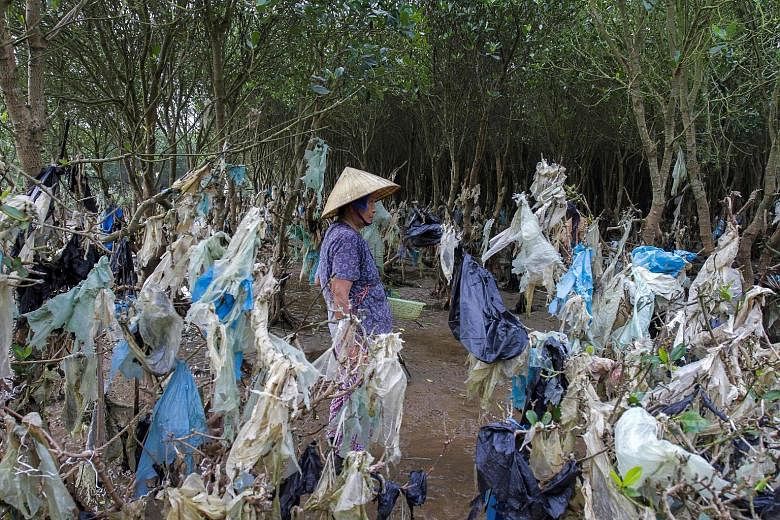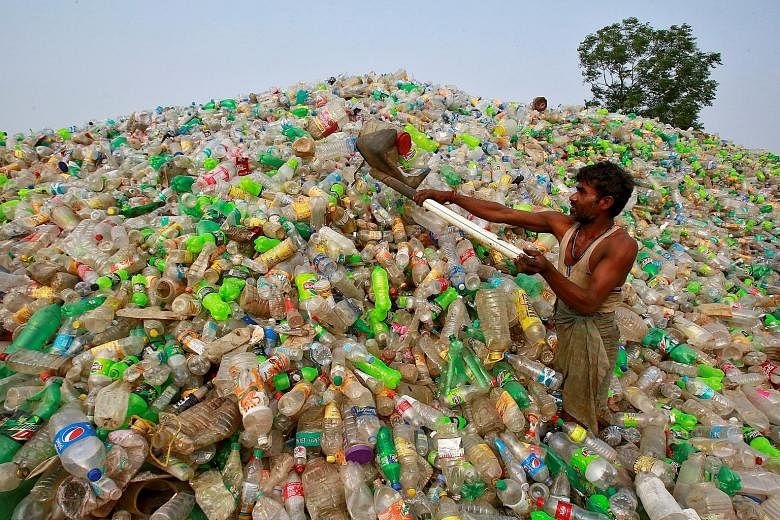THANH HOA (Vietnam) • A Vietnamese mangrove draped with polythene, a whale killed after swallowing waste bags in Thai seas and clouds of underwater trash near Indonesian "paradise" islands - grim images of the plastic crisis that has gripped Asia.
About eight million tonnes of plastic waste are dumped into the world's oceans every year, the equivalent of one garbage truck of plastic being tipped into the sea every minute of every day.
More than half comes from five Asian countries: China, Indonesia, the Philippines, Thailand and Vietnam, according to a 2015 Ocean Conservancy report.
They are among the fastest growing economies in Asia, where much of the world's plastic is produced, used and discarded - most of it improperly. "We are in a plastic pollution crisis, we can see it everywhere in our rivers, in our oceans... we need to do something about it," Greenpeace Indonesia campaigner Ahmad Ashov Birry told AFP.
World Environment Day yesterday highlighted the perils of plastic use with the tagline "if you can't reuse it, refuse it".
But it is not just an issue of aesthetics, plastics are killing marine life. Last week, a whale died in southern Thailand with 80 plastic bags in its stomach.
-
Strict recycling rules in packaging obsessed Japan
TOKYO • At a recycling plant outside Tokyo, workers in face masks pick through an unending torrent of plastic rubbish, fuelled by a national obsession with pristine packaging - and famously strict rules that ensure much of it is reclaimed and reused.
Some 10 tonnes of recyclable plastics are brought in every day to be processed at the Ichikawa Kankyo Engineering centre, where workers hover over conveyor belts removing any stray items or contaminants.
The plastic is then compressed and squeezed into huge "bales" before being moved by forklift trucks into large hangars.
Critics charge that Japan uses too much plastic, owing to the country's fondness for elaborate packaging.
There is no national legislation banning single-use plastics, and penalties or disincentives for using plastic bags are rare.
But Japan also has complicated and strictly enforced rules on separating waste to help maximise the reuse and recycling of garbage.
Local governments across Tokyo and the rest of Japan each have their own rules on how residents must separate their waste, producing flowcharts that explain which items fit into which category.
Plastics are separated from cans, paper and other recyclables, with collections for different categories on different days of the week.
Most local authorities have categories for burnable, non-burnable, recyclable and plastics, with many also requiring people to separate cardboard from different types of plastic.
That ensures more than one-fifth of plastic waste is recycled in Japan and the majority of the rest is burned either as fuel, or to generate power or heat, according to the Plastic Waste Management Institute.
Around 10 per cent is incinerated without producing any energy and less than 10 per cent ends up in landfill.
AGENCE FRANCE-PRESSE]
Experts warn the greatest threat might be invisible. Microplastics - tiny shards that easily soak up toxins after breaking off from larger plastic pieces - have been found in tap water, ground water and inside fish that millions of people eat across Asia every day.
Scientists still do not fully understand the health effects of consuming microplastics. "We're conducting a global experiment with no sense of where we're heading," Mr Carl Gustaf Lundin, head of the global marine and polar programme at the International Union for Conservation of Nature, said.
In a Vietnamese coastal village in Thanh Hoa province, a 1km stretch of beach is lined with sandals, biscuit wrappers, toothpaste tubes, juice boxes, fishing nets and heaps of discarded clothing, as piles of trash burn nearby.
Tree branches are blanketed in plastic bags left behind from tidal waters that wash up fresh waste every day. "It's hard for us to work here finding shrimp and fish," said fisherman Vu Quoc Viet.
At the current rate of dumping, the total amount of plastic trash in the world's oceans is expected to double to 250 million tonnes by 2025, according to Ocean Conservancy. That means there could be more plastic than fish in the world's seas by 2050 if the nothing is done to turn the tide.
But it is a crisis with a solution.
Social media campaigns calling for plastic bans and viral videos like the one featuring British diver Rich Horner swimming through clouds of trash off the coast of Bali have helped to spark pubic awareness.
Improved waste collection and reduced consumption have been flagged as crucial next steps.
Ocean Conservancy has called for new plastic materials and product designs as well as more investment in waste-to-energy and waste-to-fuel schemes.
For Mr Lundin, political will is perhaps the biggest hurdle. "It's not rocket science... there's no place that couldn't fix it if they decided they had to," he said.
AGENCE FRANCE-PRESSE


